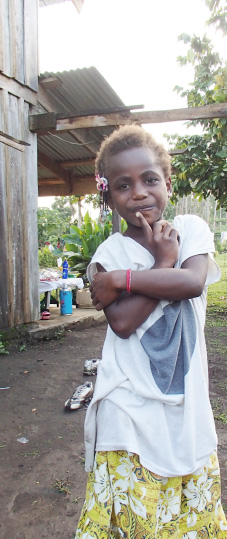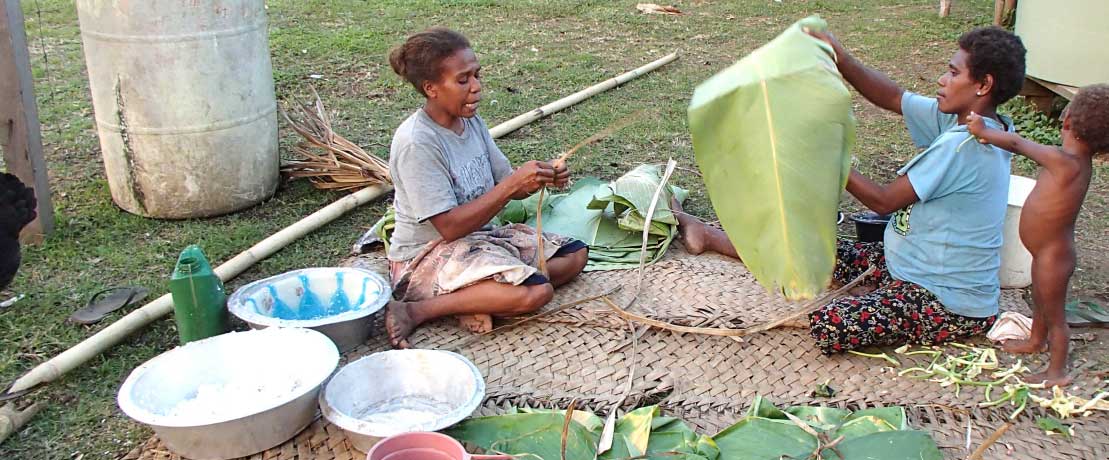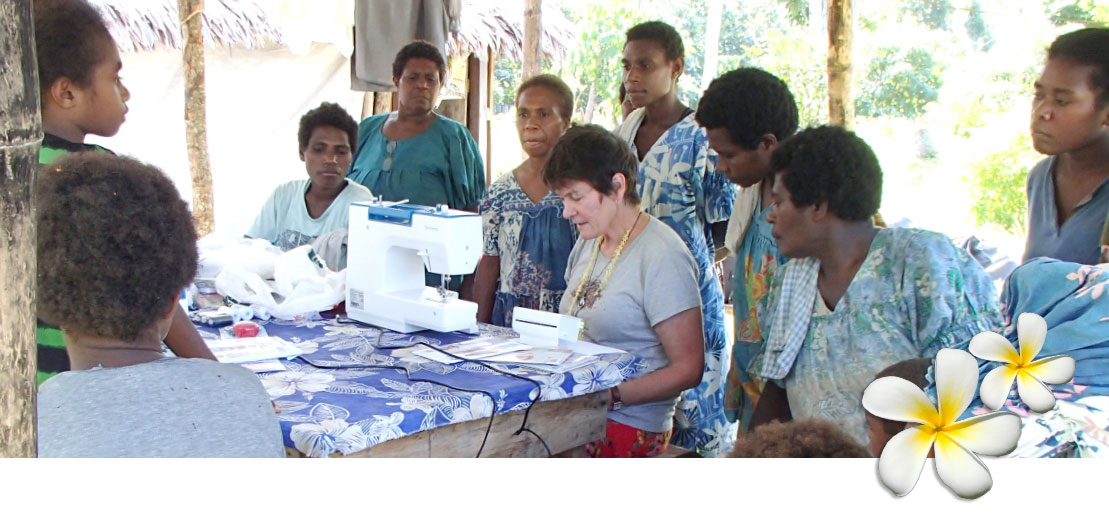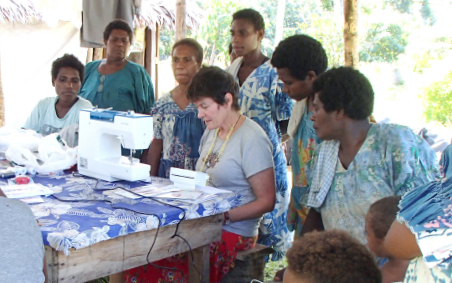.jpg) Vanuatu is deemed as the most at-risk country in the world when it comes to vulnerability to natural disasters and its ability to respond and recover from them.
Vanuatu is deemed as the most at-risk country in the world when it comes to vulnerability to natural disasters and its ability to respond and recover from them.But that hasn’t stopped one of District 9980’s smallest clubs rising to some of the biggest challenges: building up to cyclone standards and improving the island nation’s water and sanitation, as well as providing precious educational resources, health advice, sewing machines and technology … all the while, quite literally, bringing music to the ears of the people of Vanuatu (Ni-Vanuatu).

With a Rotary Foundation WASH (water, sanitation, and hygiene) grant behind them, an eight-strong team of Rotarians – seven from the Rotary Club of Dunedin North and one from the Rotary Club of Waitakere – set off to the village of Votlo, situated on the South Pacific nation’s Epi Island, in May.
Team leader Les Wilson, of Dunedin North, says the mission was as memorable and rewarding as it was challenging.
“Working and living in the village is an eye-opener – and one you don’t forget in a hurry. Daily life in Votlo was tough – sleeping on lilos, eating different foods … not to mention the fly-blown long-drop toilets,” Les says.
“Daily swims in the warm ocean brought welcome relief, though, especially after working and building in heat up around the 30degC mark.”
Under the WASH programme, the Rotarians constructed a purpose-built facility, including a community room with rain water collection and storage, composting toilets and showers – with the added brief of ensuring the structure could withstand 300kmph cyclonic winds.
Facing tight timeframes, the Rotarians spent many a night burning the midnight oil on a range of tasks, including pouring concrete into the wee small hours to keep to schedule.
As well as arriving with sports uniforms for the island’s youngsters, the Rotarians also brought five donated computers, including software and films, with IT specialist Adrian Cross setting up a dedicated computer suite.
“The computers are particularly for the young people on the island, who leave school at 12 years old, with no future prospects for education,” Les says.
“We’re still working on getting the internet up and running there.”
One of the most poignant moments, he says, came when the Rotarians gifted the island’s church a new organ to replace one that was barely working.
“What a response … what a reception – they were so excited, and described it as a ‘gift from God’.”
All in all, the programme was a resounding success due, in large part, to tireless teamwork and pulling 12-to-14 hour days to make sure everything was achieved on time and to standard.
The hard yards were more than worth it, Les says, just for the reactions alone of the villagers, who presented the team gifts at a moving farewell ceremony.
“Their response was just unbelievable … the expressions of gratitude just kept coming – they were just totally overwhelmed and grateful.”

Rotarian nurse spreads health message
Health education was a key focus during the Rotary mission to the Vanuatu island of Votlo.
Dunedin North Rotarian and registered nurse Janet Hewson packed around 15kg of medical supplies for the trip, during which she not only assessed and treated islanders, but also provided health advice.
One of the highlights of her work on Votlo was working with school children teaching health basics, including correct handwashing, proper sneezing technique, how to bend and lift safely and wound care.
“I ended up seeing the children all the time I was there and repeatedly role-modelled handwashing, sneezing and bending and lifting – the kids started mimicking me after a while.
“At least they were paying attention!”
Older islanders also benefitted from lessons in body mechanics.
“And, I had a few odd requests, like ‘check my brain’ and ‘pull my tooth’ – I can do neurological exams, but dentistry is a bit above my pay grade,” Janet says.
Generally, though, the people of Votlo were in good health.
“The food is mainly fresh fruit, vegetables, seafood, chicken and occasional pork.
“They have one truck between several villages and several horses, but, otherwise, everyone walks – a natural ‘green prescription’.”
As part of Dunedin North’s commitment to Votlo, the club is funding a local woman to complete a health worker programme.
“She’ll be able to assess, treat and monitor common conditions, but, more importantly, educate and role model healthy lifestyle choices,” Janet says.
“I’m hoping to return next year to see what changes the villagers have made since my visit and to spend time with the new health worker.
“For me, this trip was a genuine demonstration of how a nurse, as a Rotarian, can, with cultural sensitivity, help a group of people improve their health in small ways that can make a difference to the rest of their lives.”

Crafting a future
Dunedin North Rotarian, physiotherapist and talented seamstress Karen Taylor (above) gave the women and girls of Votlo not only the gift of learning to sew, but also the means to clothe their village and create income.
After a special request from the islanders, Karen arrived with a couple of new, but basic, sewing machines in tow, together with an array of bright, cotton fabrics and patterns to fit all ages. Lessons included everything from maintaining a sewing machine and cutting and pinning patterns, to stitching and finishing.
“I had no idea how much we would get done in the limited time – I was really surprised at just how many garments we turned out in only four days,” Karen says.
“The women gathered early in the morning, and stayed all day until we packed up when it was starting to get dark. Amongst the work, there was lots of laughter with getting to know each other and sharing stories.
“We used every scrap of material, including a hospital sheet that was made into a top. Even the scraps we turned in hair scrunchies.”
For the short time they had to learn, the villagers were left with the knowledge and ability to sew independently, and to an exceptional standard – a level high enough to pass on their skills to others and market their creations.
With the older women adding their advice from years of hand sewing, it was a real team effort, Karen says.
“I hope they all continue to use their skills, sewing for the village and taking garments to the local market to sell.
“What a pleasure to enter the lives of these women and work together – it was indeed a privilege.”
Collaboration in action
It’s been four years since the Rotary Club of Dunedin North decided to look for projects in Vanuatu, with a particular focus on health and education.
“Vanuatu is a very poor country,” says team leader Wayne Bowen. It’s at risk of earthquakes and hurricanes, and has a fast-growing population of 210,000, over half of whom are aged 15 or under.”
The club’s commitment to Vanuatu is a collaborative effort with the Rotary Club of Waitakere.
“We started with a project in Orap building a dining and kitchen block for a school and, over the next three years, we sent teams there to complete the project with the help of the local community, who fed us and put us up,” Wayne says.
The team also built eco toilets, reroofed school buildings, installed water tanks and reticulation, built furniture, put up mosquito netting on windows, as well as providing a computer suite, library books, musical instruments, sports uniforms, glasses and countless other items to help the community.
The latest project in Votlo was made possible through a $50,000 Rotary Foundation grant, together with $3000 in support from the Rotary Club of Wanaka.
“We’re now well into planning for our return trip next year – we’d welcome inquiries from anyone who would like to come and help, and, of course, donations to help us help this very poor community are always greatly appreciated.”
Article dated: 26 January 2017
